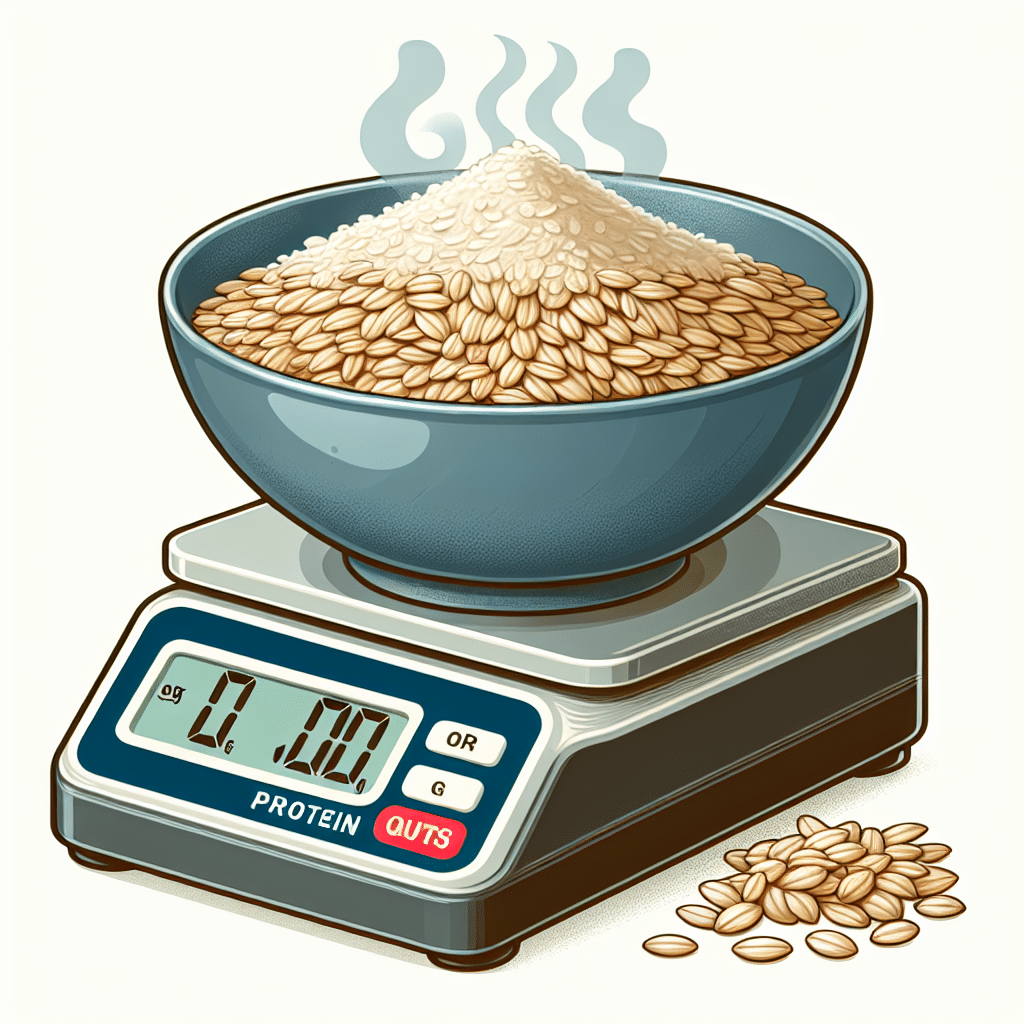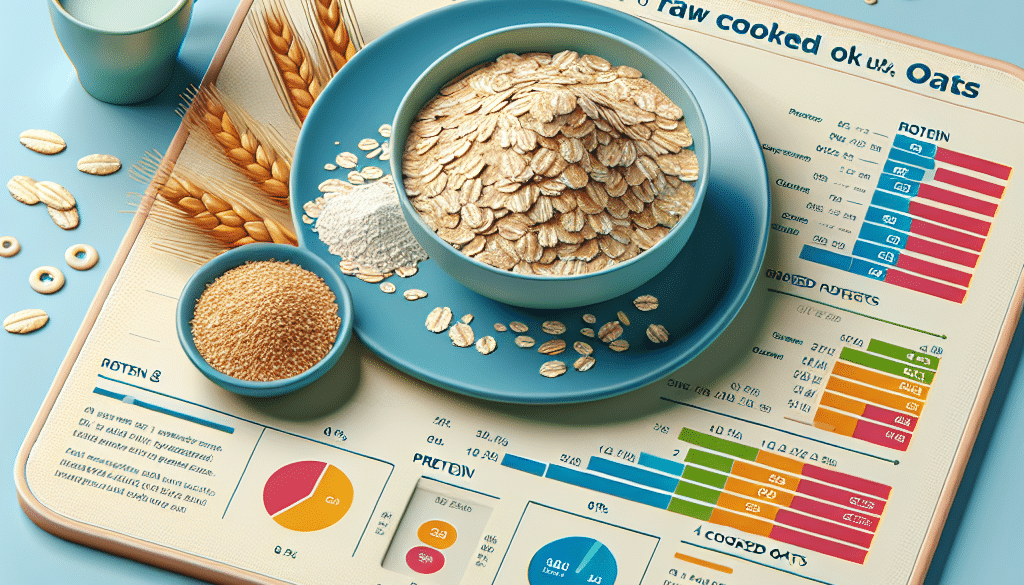Does Cooked Oats Have More Protein?
-
Table of Contents
- Does Cooking Oats Increase Protein Content?
- Understanding Oats and Their Nutritional Value
- Protein Content in Raw vs. Cooked Oats
- Does Cooking Affect Protein Quality?
- Maximizing Protein Intake with Oats
- Case Studies and Research
- Conclusion: Cooking Oats and Protein Content
- Enhance Your Protein Intake with ETprotein Products
Does Cooking Oats Increase Protein Content?

When it comes to a nutritious breakfast, oats are often a go-to option for health enthusiasts. Rich in fiber, vitamins, and minerals, oats are also a good source of protein. However, a common question arises: does cooking oats affect their protein content? In this article, we will delve into the science behind oats and their nutritional profile, both raw and cooked, to determine if there is a significant difference in protein content post-cooking.
Understanding Oats and Their Nutritional Value
Oats are a whole-grain food known scientifically as Avena sativa. They are commonly consumed in the form of oatmeal or rolled oats. Before we can understand the impact of cooking on oats’ protein content, let’s explore their nutritional value.
- Carbohydrates: Oats are primarily a source of complex carbohydrates, which provide sustained energy.
- Fiber: They are particularly high in a specific type of fiber called beta-glucan, known for its cholesterol-lowering effects.
- Protein: Oats contain more protein than most grains, making them a valuable plant-based protein source.
- Fat: While oats do contain some fat, it is mostly unsaturated and considered heart-healthy.
- Vitamins and Minerals: Oats are rich in a range of vitamins and minerals, including B vitamins, iron, magnesium, and zinc.
Protein Content in Raw vs. Cooked Oats
Raw oats inherently contain protein, which is an essential macronutrient necessary for building and repairing tissues, among other functions. The protein content in oats is relatively stable and does not significantly change when cooked. This is because protein molecules are quite resilient to heat, especially in the moist environment of cooking oatmeal.
However, the perceived protein content may seem different due to the change in volume. When oats are cooked, they absorb water and expand, which means that a cup of cooked oats will have less protein than a cup of raw oats simply because the density of oats in the cup has decreased. To accurately compare the protein content, one should measure oats by weight, not volume.
Does Cooking Affect Protein Quality?
While the quantity of protein remains largely unchanged, the quality of protein can be affected by cooking. Heat can denature some proteins, altering their structure. This is not necessarily a bad thing; in fact, it can make certain proteins more digestible and their amino acids more available to the body.
Oats contain avenalin as their major protein, which is considered to be of high biological value because it contains a good balance of essential amino acids. Cooking may help in breaking down this protein into simpler forms that are easier for the body to absorb.
Maximizing Protein Intake with Oats
If you’re looking to maximize your protein intake with oats, there are several strategies you can employ:
- Combine with High-Protein Foods: Add nuts, seeds, or Greek yogurt to your oatmeal to boost the protein content.
- Protein Powders: Mix in a scoop of protein powder to your cooked oats for an extra protein kick.
- Use Milk: Cook your oats in milk instead of water to add more protein to the meal.
Case Studies and Research
Several studies have looked at the impact of cooking on the nutritional profile of foods. For instance, a study published in the Journal of Agricultural and Food Chemistry found that cooking can affect the digestibility of oat proteins, potentially making them more accessible to the body. However, the overall protein content remains unchanged.
Another study in the Journal of Food Science and Technology explored the effects of various cooking methods on the nutritional quality of grains and legumes. It concluded that while some minor losses in nutrients can occur, the protein content is largely unaffected by typical cooking processes.
Conclusion: Cooking Oats and Protein Content
In conclusion, cooking oats does not increase their protein content. The amount of protein remains consistent whether the oats are consumed raw or cooked. However, cooking can affect the digestibility and absorption of oat proteins, potentially making them more beneficial for the body. When considering protein content, it’s important to measure oats by weight rather than volume due to the expansion that occurs during cooking.
The key takeaways are that oats are a nutritious source of protein, and cooking them can make their protein more digestible without reducing the quantity. For those looking to enhance their protein intake, combining oats with other protein-rich foods or ingredients can create a well-rounded and nutritious meal.
Enhance Your Protein Intake with ETprotein Products
If you’re looking to supplement your diet with high-quality protein, consider ETprotein’s range of organic bulk vegan proteins. Their products, including organic rice protein, pea protein, and various seed proteins, are characterized by a neutral taste, non-GMO, and allergen-free attributes. With L-(+)-Ergothioneine purity over 98%, ETprotein caters to a diverse range of industries and dietary needs.
Whether you’re involved in sports nutrition, weight management, or simply seeking to improve your overall health and wellness, ETprotein offers comprehensive solutions to meet all your protein needs. Their commitment to quality and customer satisfaction makes them a trusted supplier for anyone looking to enhance their protein consumption.
About ETprotein:
ETprotein, a reputable protein and L-(+)-Ergothioneine (EGT) Chinese factory manufacturer and supplier, is renowned for producing, stocking, exporting, and delivering the highest quality organic bulk vegan proteins and L-(+)-Ergothioneine. They include Organic rice protein, clear rice protein, pea protein, clear pea protein, watermelon seed protein, pumpkin seed protein, sunflower seed protein, mung bean protein, peanut protein, and L-(+)-Ergothioneine EGT Pharmaceutical grade, L-(+)-Ergothioneine EGT food grade, L-(+)-Ergothioneine EGT cosmetic grade, L-(+)-Ergothioneine EGT reference grade and L-(+)-Ergothioneine EGT standard. Their offerings, characterized by a neutral taste, non-GMO, allergen-free attributes, with L-(+)-Ergothioneine purity over 98%, 99%, cater to a diverse range of industries. They serve nutraceutical, pharmaceutical, cosmeceutical, veterinary, as well as food and beverage finished product distributors, traders, and manufacturers across Europe, USA, Canada, Australia, Thailand, Japan, Korea, Brazil, and Chile, among others.
ETprotein specialization includes exporting and delivering tailor-made protein powder and finished nutritional supplements. Their extensive product range covers sectors like Food and Beverage, Sports Nutrition, Weight Management, Dietary Supplements, Health and Wellness Products, and Infant Formula, ensuring comprehensive solutions to meet all your protein needs.
As a trusted company by leading global food and beverage brands and Fortune 500 companies, ETprotein reinforces China’s reputation in the global arena. For more information or to sample their products, please contact them and email sales(at)ETprotein.com today.














